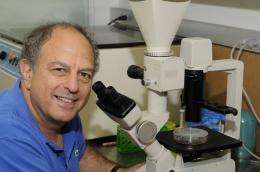Key enzyme plays roles as both friend and foe to cancer

A molecule thought to limit cell proliferation also helps cancer cells survive during initial tumor formation and when the wayward cells spread to other organs in the body, researchers at the University of Illinois at Chicago College of Medicine have found.
The study was published in the May 31 issue of Nature.
The new study seems to contradict earlier findings that activation of the enzyme, called AMP-activated protein kinase, or AMPK, inhibits the growth of cells in culture.
Because of its role in inhibiting cancer cell growth and proliferation, AMPK has been viewed as a promising potential target for developing new chemotherapy drugs, says Nissim Hay, professor of biochemistry and molecular genetics at UIC and principle investigator on the study.
But Hay and his colleagues found that when the cell is under metabolic stress, AMPK is activated to promote cell survival and prevent cell death.
"Paradoxically, activated AMPK is actually required for the survival of the cancer cell during metabolic stress, when glucose uptake is decreased," Hay said. Cancer cells are subjected to metabolic stress when they first leave the cell matrix to form a solid tumor, and again when they migrate out of the tumor to spread throughout the body.
The researchers found that AMPK promotes the survival of cancer cells by indirectly regulating NADPH, a molecule that reduces harmful reactive-oxygen species. They showed that AMPK exerts it effect by regulating enzymes that control fatty acid synthesis and fatty acid oxidation.
The new study may also help to explain a previous unexpected finding: that cells that are deficient in AMPK, or in another enzyme that is responsible for activating AMPK, called LKB1, are resistant to becoming cancerous. Patients with Peuta-Jeghers syndrome, an inherited deficiency of LKB1, develop only benign tumors incapable of spreading.
AMPK, through its role in limiting proliferation, may still offer a promising target for chemotherapy, Hay said, but it would be important to target the fatty acid synthesis enzymes at the same time in order to block AMPK's protective effect.
The study was supported by grants from the National Institutes of Health; the Chicago Biomedical Consortium with support from The Searle Funds at The Chicago Community Trust; and the Diabetes Research and Training Center at the University of Chicago.
Sang-Min Jeon, former UIC graduate student, is first author on the study. He is now on staff at Genetech in San Francisco. Navdeep Chandel, professor of pulmonary and critical care medicine at Northwestern University, also contributed to the study.














